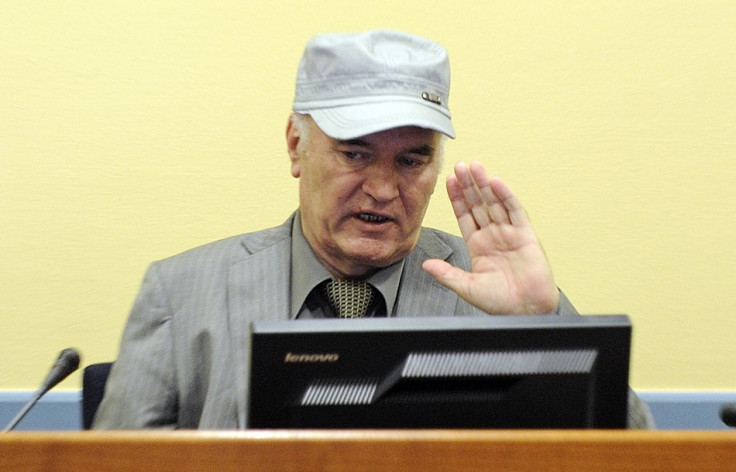Ratko Mladic and the ICTY: A kangeroo court or not?

"Can a criminal tribunal for Yugoslavia which ignores pervasive violence by the U.S. and diverts public awareness from United States conduct and legitimatizes by silent acceptance aerial and missile assaults on civilians and illegal weapons use against one country after another, making its repetition expected before it occurs, contribute to the hope for the rule of law, justice or peace?"
That statement was made by former Serbian President Slobodan Milosevic and its seems that newly arrested Ratko Mladic agreed with the Serbian dictator as today in court he refused to enter a plea at the tribunal saying that the charges against him were "obnoxious."
The UN tribunal has been controversial ever since its establishment in 1993 and many Serbians still see it as yet further proof of western imperialism.
MANDATE
The tribunal was the first international body for the prosecution of war crimes since the Nuremberg and Tokyo trials held in the aftermath of World War II.
The ICTY was established by Resolution 827 of the UN Security Council in May 1993 and all UN members are obliged to co-operate fully with it.
It has jurisdiction over individuals responsible for war crimes committed in the territory of the former Yugoslavia since 1991, where the offences are considered to represent grave breaches of the 1949 Geneva Convention, violations of laws or customs of war, genocide and crimes against humanity.
The tribunal may not try suspects in absentia, nor impose the death penalty and the maximum sentence it can hand down is life imprisonment.
It has its own teams of investigators working across former Yugoslavia but does not have its own police force and consequently can only rely on former Yugoslav republics or international peace forces to make arrests.
If the tribunal has concurrent jurisdiction with national courts over war crimes committed in the former Yugoslavia, it can nonetheless claim primacy over national courts and may take over national investigations and proceedings at any stage if this proves to be in the interest of international justice.
The tribunal is expected to wrap up its work by December 2014 and no one will be accepted in The Hague after the June 30 2012, after which the International Residual Mechanism will take over.
Controversy
Despite insistence that the ICTY was set up in the Hague because "at the time, no regional courts had the capacity, or the will, to conduct objective and impartial prosecutions of the crimes that had been, and continued to be committed", the tribunal still has a large amount of detractors.
Most of the reasons behind the critics' refusal to see the UN tribunal as a legitimate body are the same contained in Milosevic's statement.
They question the authority of the U.N. Security Council to create a criminal court as they insist that such a body can only be created by a multinational treaty or an amendment to the Charter of the UN.
According to Milosevic, the Security Council constituted "a new and powerful weapon capable of demonizing a nation and its people and depriving individuals of their liberty for the rest of their lives, and placed it largely in the hands of the United States. "
Many critics in Serbia still advance that the tribunal constitute yet another tool used by colonial power to hinder the sovereignty of weaker countries and subjugate their peoples.
Another problem advanced is the fact that the ad-hoc tribunal only targets one country and its officials. In Serbia, many were angry and frustrated by the role that NATO and the U.S played and actively called for their prosecution for a bombardment campaign that lasted 79 days and killed Serbian civilians.
They also see the court as having been imposed on them while powerful countries like the U.S are still able to avoid ratifying the International Criminal Court's Rome Treaty.
Finally, during his trial, Milosevic repeatedly claimed that the court had no concern for the rights of those accused and demonised them. He said he was refused the right to assistance of counsel as his lawyers were refused the right to enter the Netherlands, and that his wife was treated as a virtual prisoner while at the Hague.
Impacts and Achievements
Well, it's funny how those responsible for the most atrocious crimes are always the first ones to call for justice when they are held accountable. Mladic, for example, is now trying to pass as a very frail person in need of medical help.
So yes the tribunal was slow at first and encountered flaws but during its 18 year of existence, it has still achieved a lot. One has to remember that when it was first set up, even its founders had doubts as to whether it would ever succeed in indicting anyone and holding trials. However, within the first three years of its existence, it was able to issue its first indictment and render its first judgement. In total, it has indicted 161 individuals and has, to date, concluded proceedings against 125 of them.
At an international level, the tribunal has proved that efficient and transparent international justice is viable. Its achievements have inspired the creation of other similar courts worldwide, such as the International Criminal Tribunal for Rwanda, the permanent International Criminal Court but also and maybe most importantly the hybrid courts in Sierra Leone and Cambodia, which prove that weaker and poorer countries are now willing to fight to establish stronger and more transparent judiciary apparatus in order to try war criminals themselves.
Also, and although many attempt to ignore this fact, the ICTY has had an important impact on the region's local judiciary as it actively works on the strengthening of the local courts' and has referred a total of 13 cases to them.
© Copyright IBTimes 2024. All rights reserved.






